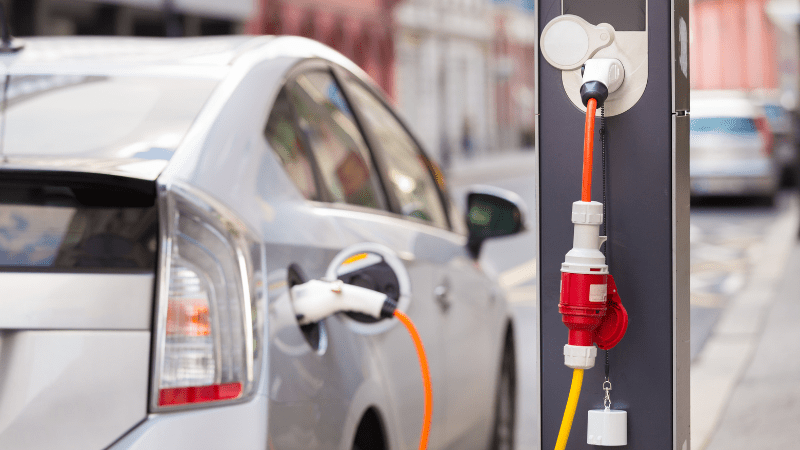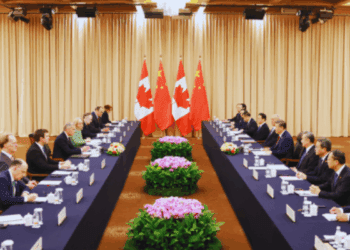This article originally appeared in the Globe and Mail.
By Heather Exner-Pirot, March 21, 2024
When the Alberta government announced its 2024 budget at the end of February, one item in particular raised eyebrows: a new registration fee of $200 on electric vehicles, beginning in January, 2025.
The justification was simple: EVs don’t pay fuel taxes when they are charged at home, which they often are. EVs are also, on average, heavier than their combustion engine counterparts, and thus, on average, more damaging to roads. Absent a clear usage metric by which to charge EV drivers for their share of road maintenance costs, an annual flat fee would be imposed.
The response, as with so many of Alberta’s policies, was predictable. The governing UCP was criticized for being unfair and ideologically driven with a policy that is just another instance of the province stymying climate action. Never mind that Saskatchewan began charging a fee in 2021, or that more than 30 U.S. states charge a similar fee, ranging from US$50 to US$225, including perennially progressive California. But the fee was seen by many as an attack.
It is worth reflecting on how a completely reasonable user fee could be met with so much skepticism and disdain. At the root of it is a culture around EVs and their owners that sees them as environmentally conscious, social progressive citizens who should be lauded and supported. The most regressive policy in the country – the suite of EV subsidies – has somehow been branded its most virtuous.
Now the tide is turning. I suspect EV incentives will soon reach the end of their road.
I’ve got no quarrel with EV owners and makers, and aspire to have one of my own. But if I bought one today my fellow taxpayers would be obliged to pay for a good portion it. In Canada the federal government will cover $5,000 of the purchase cost of most EV models, and several provinces will absorb a few thousand dollars more.
According to a 2022 study by the Macdonald-Laurier Institute, the equivalent carbon tax for such a subsidy – the amount that is being paid to avoid emissions – would be $355/tonne of GHGs in Alberta and Saskatchewan and a whopping $964/tonne in Quebec. There are a multitude of ways to reduce emissions that cost less than applying our limited resources to EVs instead.
But the government support does not stop there. Ottawa has put in place a $680-million Zero Emission Vehicle Infrastructure Program to build out a network of charging stations until 2027. Several provinces offer incentives, usually of a few hundred dollars, for home EV chargers. And the Parliamentary Budget Officer estimates the cost of announced governments supports for EV battery manufacturing to be $43.6-billion over the next 10 years.
The primary beneficiary of this generous support has not been the environment, but EV drivers, the demographics of which are predominantly middle-aged, white men earning more than $100,000 year. EV drivers are also much more likely to own their home and have a garage, an increasingly privileged position in Canadian society. Let us not begrudge anyone their EVs. But don’t ask the college student with a 2006 Civic to cover the costs of the wear and tear on the roads.
Fuel consumption levies are not perfectly correlated to road usage but they are very important sources of revenue to cash-strapped municipalities and provinces. In most places they fund a variety of infrastructure and public needs, including mass transportation – all the more reason EV owners should pay their fair share.
The federal Liberals are under fire for their carbon tax, which is looking increasingly politically untenable. But as climate policy it is superior to the suite of EV subsidies in almost every way: cheaper, fairer, more transparent and progressive. While low-income earners tend to benefit from the carbon tax – as wealth redistribution policy it is pretty effective, even if the impact on emissions is thus far slight – EV incentives favour the wealthy.
This is not a made-in-Alberta argument. Quebec made its own EV announcement in its 2024 budget this month: it plans to lower and then eliminate EV incentives by 2027, citing the program’s high costs alongside its limited impact on emissions. Many in Europe are doing the same. Germany ended its EV subsidy program abruptly in December as it struggled to balance its budget as required under law.
EV subsidies will continue to come under attack because their policy flaws are clear. There are dozens of cheaper ways to reduce carbon emissions, but almost none as regressive.
Heather Exner-Pirot is the director of Energy, Natural Resources and Environment at the Macdonald-Laurier Institute.






